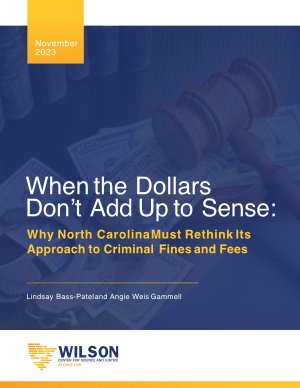By Lindsay Bass-Patel and Angie Weis Gammell
Courts across the country, including those in North Carolina, impose financial obligations on people when they are convicted of a crime or infraction. These court imposed financial obligations include fines, a form of financial punishment, and fees, which fund government services. North Carolina has increased its reliance on fines and fees as a revenue source over the past 20 years. 1 This practice harms many North Carolinians and is also an inefficient financial strategy for the state. In the past decade, other states have begun to reevaluate their use of fines and fees. North Carolina can find guidance from states like Louisiana, which has eliminated fees for juveniles, and Georgia, which has enacted guidelines to determine a person’s ability to pay before imposing fines or fees. Fines and fees disproportionately impact poor people and people of color, and in so doing, burden them with paying for government services that support all members of society. North Carolina courts often impose fines and fees without considering a person’s ability to pay them. When a person does not have the financial means to pay, they face difficult, perilous choices. These choices result in some people paying fines or fees rather than buying groceries or medicine; some people losing their driver’s license for not paying the fines or fees; and some people being taken to jail for failing to pay even when the original infraction had no risk of jail time. 2 Furthermore, fines and fees are an unreliable and ineffective revenue source. The time and resources spent trying to collect court fines and fees can cost more than the money collected. 3 The North Carolina Administrative Office of the Courts (“AOC”) does not publicly share information on the total amount of fines and fees imposed or outstanding. Instead, the publicly shared financial data shows the amount people pay to the Clerks of Superior Court. According to this information, the state recouped $204.9 million in fiscal year 2020-2021 from fines and fees in criminal cases, which constituted only 0.3% of the state’s revenue for that year. 4 North Carolina must examine its use of fines and fees, including the harm it has on residents, their families, and their communities; eliminate fees; and reduce fines imposed in criminal court.
Durham, NC: Wilson Center for Science and Justice at Duke Law, 2023. 36p.


